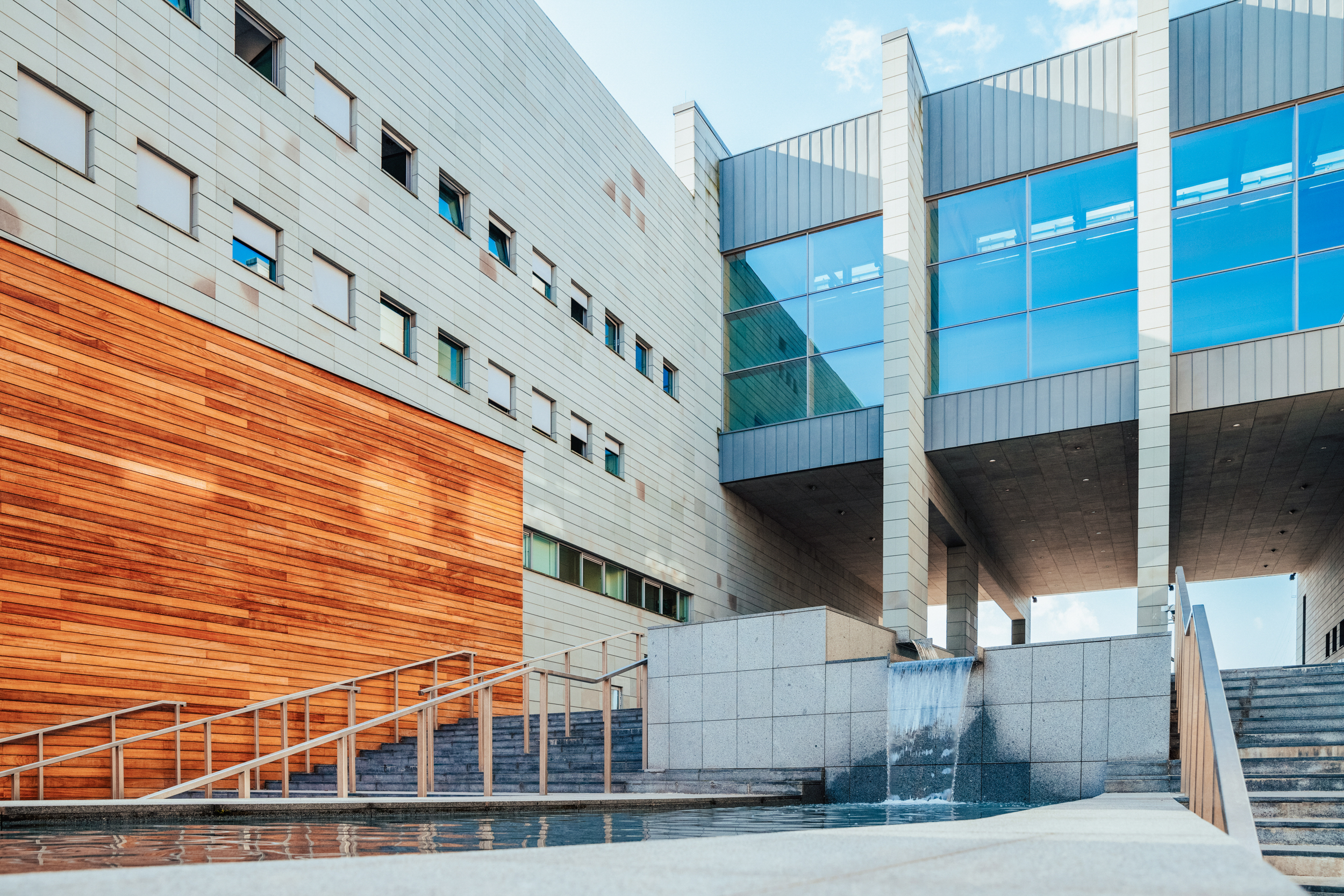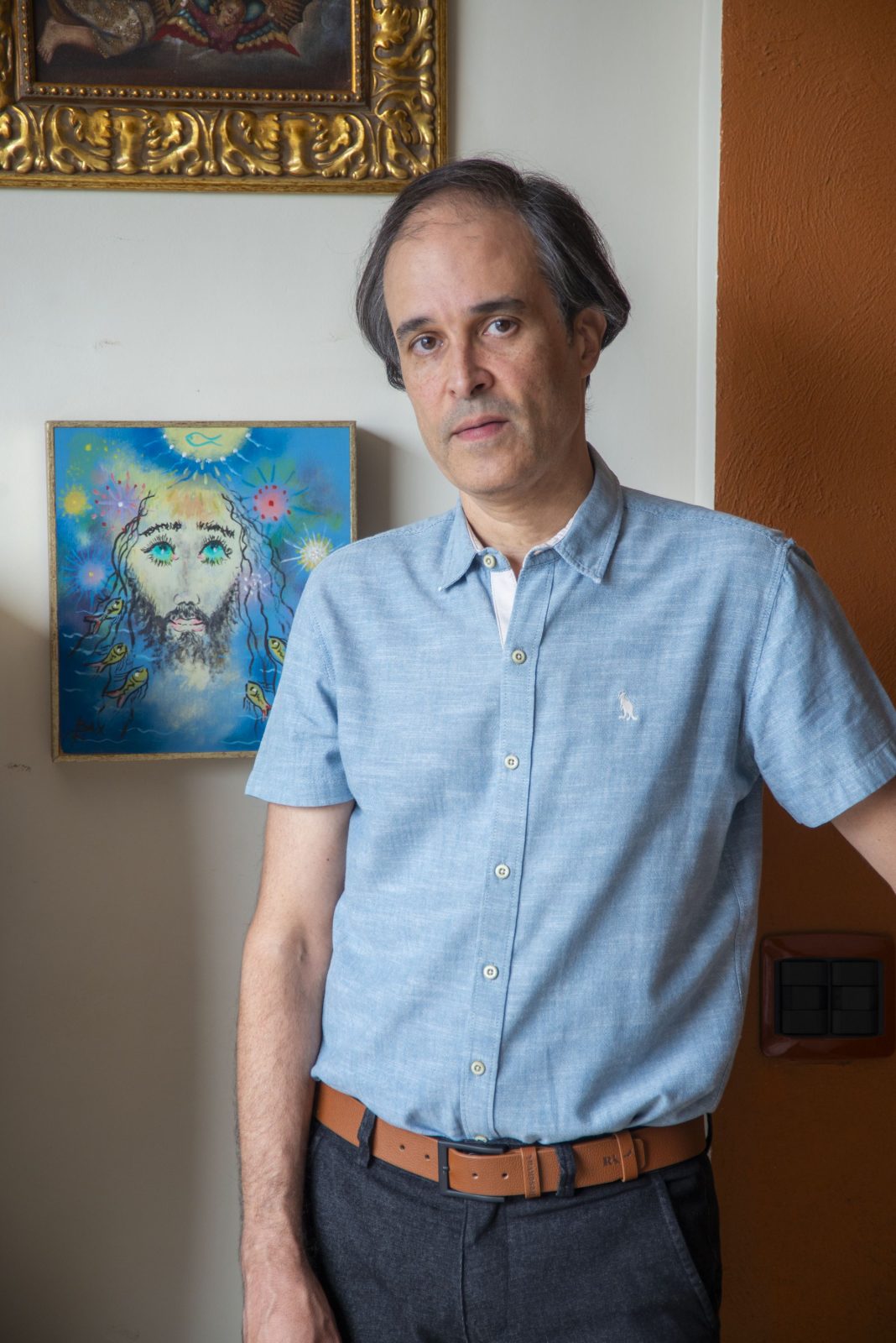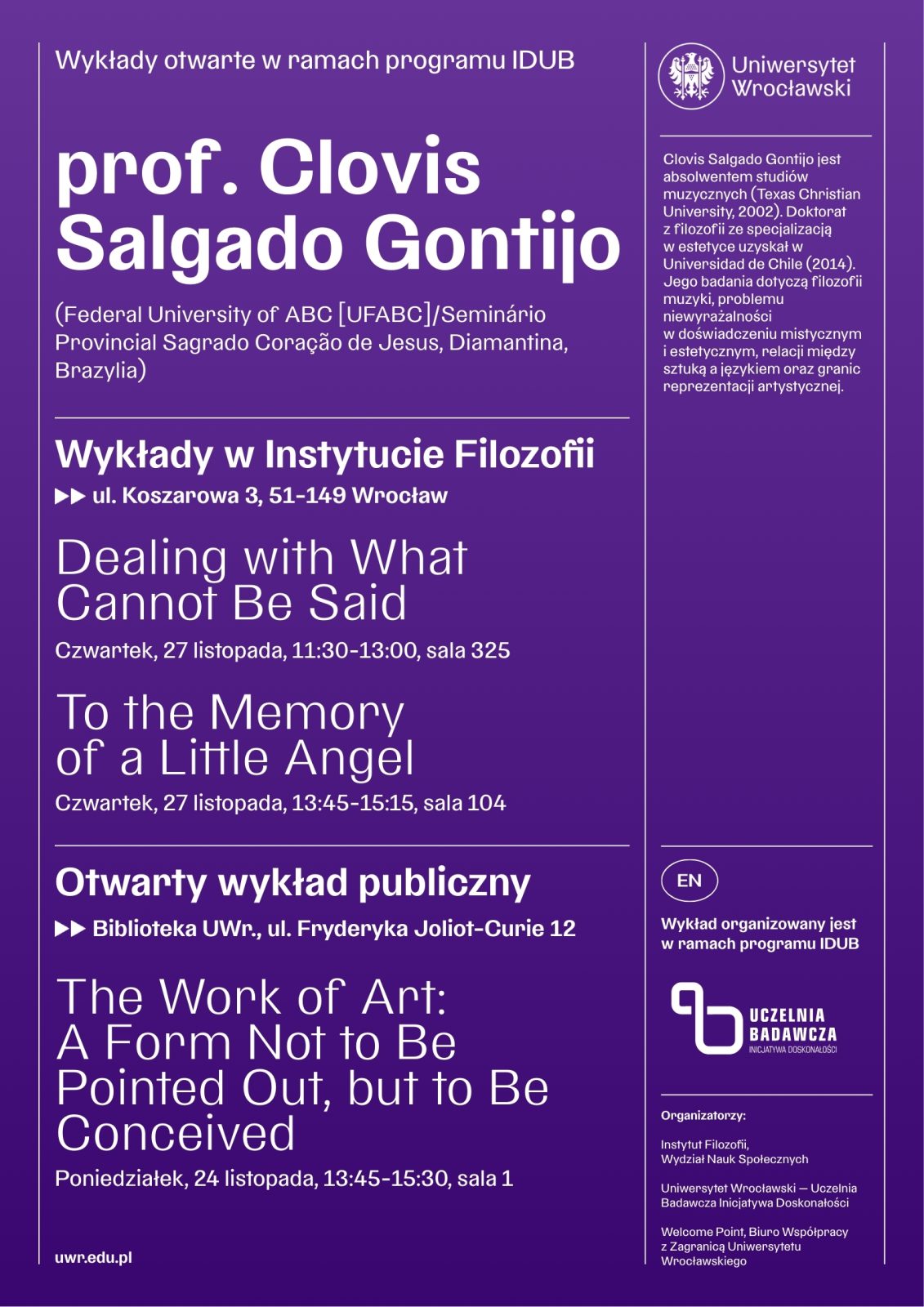
Prof. Clovis Salgado Gontijo gościem Instytutu Filozofii UWr
Instytut Filozofii Wydziału Nauk Społecznych Uniwersytetu Wrocławskiego w dniach 24-27 listopada 2025 roku będzie gościł profesora wizytującego w ramach programu IDUB – prof. Clovisa Salgado Gontijo (Federal University of ABC [UFABC] / Seminário Provincial Sagrado Coração de Jesus, Diamantina, Brazylia). W trakcie jego pobytu odbędą się trzy wydarzenia: wykład publiczny w Bibliotece Uniwersyteckiej oraz dwa warsztaty/seminaria organizowane na kampusie Wydziału Nauk Społecznych przy ul. Koszarowej.
Poniżej prezentujemy program wydarzeń związanych z pobytem prof. Clovisa Salgado Gontijo na Uniwersytecie Wrocławskim.
- 24 listopada (poniedziałek) w Bibliotece Uniwersyteckiej przy ul. Fryderyka Joliot-Curie 12 w godzinach 13:45-15:30 odbędzie się wykład publiczny pt. The Work of Art: A Form Not to Be Pointed Out, but to Be Conceived.
O wykładzie
The book Problems of Art, published in 1957, brings together ten lectures and an appendix on “Abstraction in Science and Abstraction in Art”, by the American philosopher Susanne K. Langer (1895-1985). As the fruit of her mature reflection on art, the volume presupposes and revisits some of the hypotheses and concepts formulated in her previous works. One of the reexamined concepts is that of the “symbol” –developed by Langer in continuity with Ernst Cassirer’s approach– and its possible application to the work of art. This lecture will relate Langer’s remarks on the „art symbol” and on the „symbol in art”, a distinction clarified in Problems of Art, to a famous pictorial work — The Calling of Saint Matthew (1599-1600) by Caravaggio, one of the three paintings on the life of Saint Matthew that compose the Contarelli Chapel in the church of San Luigi dei Francesi, in Rome. The Calling of Saint Matthew, which features an impressive interplay of hand gestures pointing to different characters in the scene, may help us understand the conceptual and not signific function of the art symbol according to Langer’s semantic and anthropological approach to the philosophy of art. - 27 listopada (czwartek) w Instytucie Filozofii Wydziału Nauk Społecznych przy ul. Koszarowej 4 odbędą się dwa warsztaty/seminaria: Dealing with What Cannot Be Said (godz. 11:30–13:00, sala 325) oraz To the Memory of a Little Angel (godz. 13:45–15:15, sala 104).
Dealing with What Cannot Be Said
This lecture will examine – apparently through a paradoxical path, that is, verbally – the theme of the unsayable. At first, some realities and some spheres of human experience before which we recognize the limits of words will be presented, such as death; violence; divinity; mystical, artistic and sensory experiences; the realm of our affections; grace; and human’s interiority. After this overview, it will be necessary to verify whether the verbal treatment of the unsayable is indeed paradoxical, by drawing on Vladimir Jankélévitch’s (1903-1985) distinction between the unspeakable (l’indicible) and the ineffable (l’ineffable), the two antipodean poles of the inexpressible. If a verbal expression of the ineffable, in particular, is still possible, would there be specific strategies for approaching it? Finally, the reflection turns to whether a philosophical analysis of the discursively inexpressible may contribute to the epistemological, linguistic, and aesthetic fields, asserting something beyond the mere unsayability of what cannot be said.
To the Memory of a Little Angel
During the first decades of the 20th century, the Brazilian photographer Chichico Alkmim (1886-1978) portrayed around forty-six photographs of dead infants, the so-called anjinhos (“little angels”) –an international photographic practice at his time. These tender and poignant images may be suggestively placed in dialogue with the philosophy of Vladimir Jankélévitch (1903-1985). Although the latter is quite critical of postmortem portraits and does not focus specifically on photography in his “musical” thought, he occasionally expresses a significant concern with the death of a child. Moreover, some of his key philosophical themes –such as death, irreversibility, nostalgia, innocence, transience and the unspeakable– make Jankélévitch’s philosophy a privileged framework for reflecting on a child’s death and its modes of representation. Despite departing from a past photographic practice, this theme reveals a striking contemporaneity today, when the unspeakability of an infant’s death is intensified by situations of war, urban violence, and forced migrations, calling for a renewed commitment to the memory of the child.
Wszystkie wydarzenia będą transmitowane online. Aby uczestniczyć zdalnie, prosimy o kontakt mailowy pod adresem: mariusz.turowski@uwr.edu.pl. W odpowiedzi zostanie przesłany link do transmisji.
Biogram

Clovis Salgado Gontijo jest absolwentem studiów muzycznych (Texas Christian University (MA, 2002). Doktorat z filozofii ze specjalizacją w estetyce uzyskał w Universidad de Chile (2014). Jego badania dotyczą filozofii muzyki, problemu niewyrażalności w doświadczeniu mistycznym i estetycznym, relacji między sztuką a językiem oraz granic reprezentacji artystycznej. Wśród publikacji prof. Gontijo są między innymi monografie Ressonâncias noturnas: do indizível ao inefável (Loyola, 2017) oraz „L” de Diferença (Quixote+Do, 2020). Przetłumaczył i napisał przedmowy do brazylijskich wydań La Musique et l’ineffable Władimira Jankélévitcha (Perspectiva, 2018), Quelque part dans l’inachevé Béatrice Berlowitz i Jankélévitch (Perspectiva, 2021) oraz Problems of Art Susanne K. Langer (Kichot, 2026). Był profesorem i pracownikiem naukowym w Faculdade Jesuíta de Filosofia e Teologia (FAJE) w Belo Horizonte. Obecnie wykłada na Universidade Federal do ABC (UFABC) i w Seminário Provincial Sagrado Coração de Jesus w Diamantina.

Data publikacji: 21.11.2025
Dodane przez: M.K.



